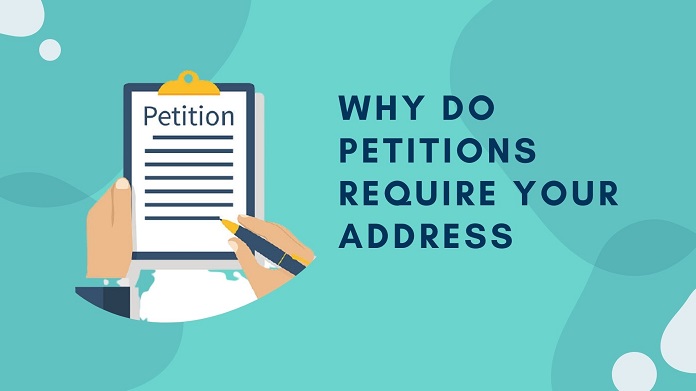Why Do Petitions Require Your Address?
If you’ve been involved in any type of sociable fairness advocacy, you may have noticed that most petitions need you to provide your address or your zip code.
That demand associated with other details you have to provide–even if you arrange with the cause of the petition– could make you a little wary of signing your name.
You may wonder why so much knowledge is necessary. Petitions usually ask for your address so they can confirm the legitimacy of the signatures they’ve gathered.
Further, sometimes when the petition is founded on a problem affecting a particular area, addresses and zip codes can indicate strong local support for change.
Nowadays ZipCode makes us easy to find out our location if you are trying to find out what is my location. Then let us be the help to your long search.
If you would like to examine requisitions and how they work so that you can make certain your signature is going towards a deserving cause, we’ve got you covered.
In the following several sections, we will lay out why petitions require your zip code, how effective they can be, and how to tell if a requisition comes from a respected advocacy group. You’ll be ready to discern the right petitions for you to sign in no time!
Why Do Petitions Need Your Zip Code?
You’ve presumably noticed that when you sign a petition–be it online or in person–someone or group usually asks for your name, email, and zip code, or full address.
This is in extensive part because it is easy for online trolls and others with less than benevolent intents to flood a petition with fake signatures–usually in an attempt to delegitimize it.
The other reason zip codes can be extremely important is that like full addresses, zip codes suggest that you have strong support from the local community.
Having local support can bolster your probability of affecting real change dramatically, so if you’re a petitioner it especially behooves you to find a way to prove that support.
Can Sign a Petition Lead to Identity Stealing?
When a petition begins to ask for knowledge like your zip code or your full address, you may wonder if this improves your risk of evolving a victim of identity theft.
The truth is a little complex, however, the risk of identity theft from signing a petition remains low if you take steps to confirm its legitimacy.
Experts have weighed in on this topic and conclude that a group just knowing your name and address, doesn’t significantly improve the probabilities they’ll commit identity theft.
That said, it is important to bear in intellect that conveying out your signature slightly raises your risk, due to the way we use signatures in so many financial transactions.
Though identity theft is possible, it is still highly unlikely. If you’re scammed by a fake petition it is much more likely that the scammer will simply sell your information so that companies can spam you.
Again, this can be avoided by taking a few steps to make sure you know who you’re dealing with. We’ll lay some of those steps out exactly in the next section.
How to Tell if a Petition is Legitimate
To make sure that the petition you’re signing is going towards a cause you care about and not just paying lip service to it to get your information, you should always make sure it is legitimate.
Below is a quick list of tips that will help you to determine whether the petition you’re thinking of signing is reputable today.
- Find out who is behind the petition: This is easier to do online, however before you sign any petition make sure that you know which advocacy group you are dealing with.
There are some highly reputable groups out there, however, some quasi scammers are floating around as well that just want to sell your email or phone number. A quick Google search can save you a lot of trouble. - Make sure the petitioner isn’t asking for too much information: If you encounter someone who isn’t using a reputable site for a petition such as Change.org, and they start asking for info like your social security number.
That should be an instant red flag that they are just trying to con you. A petitioner shouldn’t ask for any information more invasive than your zip code or address. - Find out where the petition is going: To make sure that you’re signing an effective petition, you should make sure that it is going to the right place.
If someone is petitioning for a hyper-local issue, they probably don’t need to be sending it to the president.
- Pay close attention to the wording: This is more so that you know you’re signing a petition that represents your views.
Some groups with questionable motives can try to word things in a way that anyone would want to sign. To make sure you’re supporting the cause you want, you should read the fine print.
Do Petitions Work?
- Petitions raise awareness: When a massive petition is levied, it can become big news and help raise awareness of issues.
Also, sometimes when a person knows that there are a lot of other people out there who agree with them, that alone is enough to influence them to speak up themselves. - Petitions put those in power on notice: Politicians need the support of the people to keep their power.
If they see that an issue has become so universally promoted by the public, they will feel more pressure to address it.
Putting pressure on politicians and others in power is one of the main consequences of a successful petition. - Petitions show solidarity: Marginalized groups and their allies can show support by voicing their concerns in the form of a petition.
Though petitions are only one of the ways we should show solidarity, they can make a great start.
Plus, having a growing number of signatures is a powerful way to show just how many people support your movement.


Comments
Post a Comment